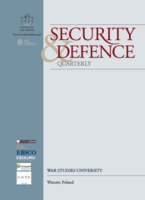Small powers as non-permanent members of
the United Nations Security Council: A case
study of the Baltic States
Small powers as non-permanent members of
the United Nations Security Council: A case
study of the Baltic States
Author(s): Eduards GailišsSubject(s): Governance, Security and defense, Geopolitics, Peace and Conflict Studies
Published by: Akademia Sztuki Wojennej
Keywords: United Nations; Security Council; Baltic states; small powers;
Summary/Abstract: The main objective of this paper is to identify how small powers can make a difference by taking up a role at the United NationsSecurity Council (UNSC) as non-permanent members. This research takes a closer look at the Baltic states, Lithuania and Estonia,and give a perspective for Latvia too. This paper examines whether these states use strategies that have made other small powerssuccessful at the Security Council. Most of the materials used were documents from foreign services and the UNSC, and the methodsemployed were qualitative document analysis and interview. Lithuania was successful at making resolutions and highlighted topics,such as small arms and protection of journalists, whereas Estonia was successful at agenda setting and highlighted cyber security andenvironment security. Small powers can successfully work at the UNSC by setting the agenda and working on resolutions. However,their time as part of the UNSC is limited and their abilities to solve military conflicts depend on the support of the great powers.The Baltic states used some strategies that other small powers have successfully used, although they lacked influence for mediation andcoalition building.
Journal: Security and Defence Quarterly
- Issue Year: 45/2024
- Issue No: 1
- Page Range: 33-54
- Page Count: 22
- Language: English

